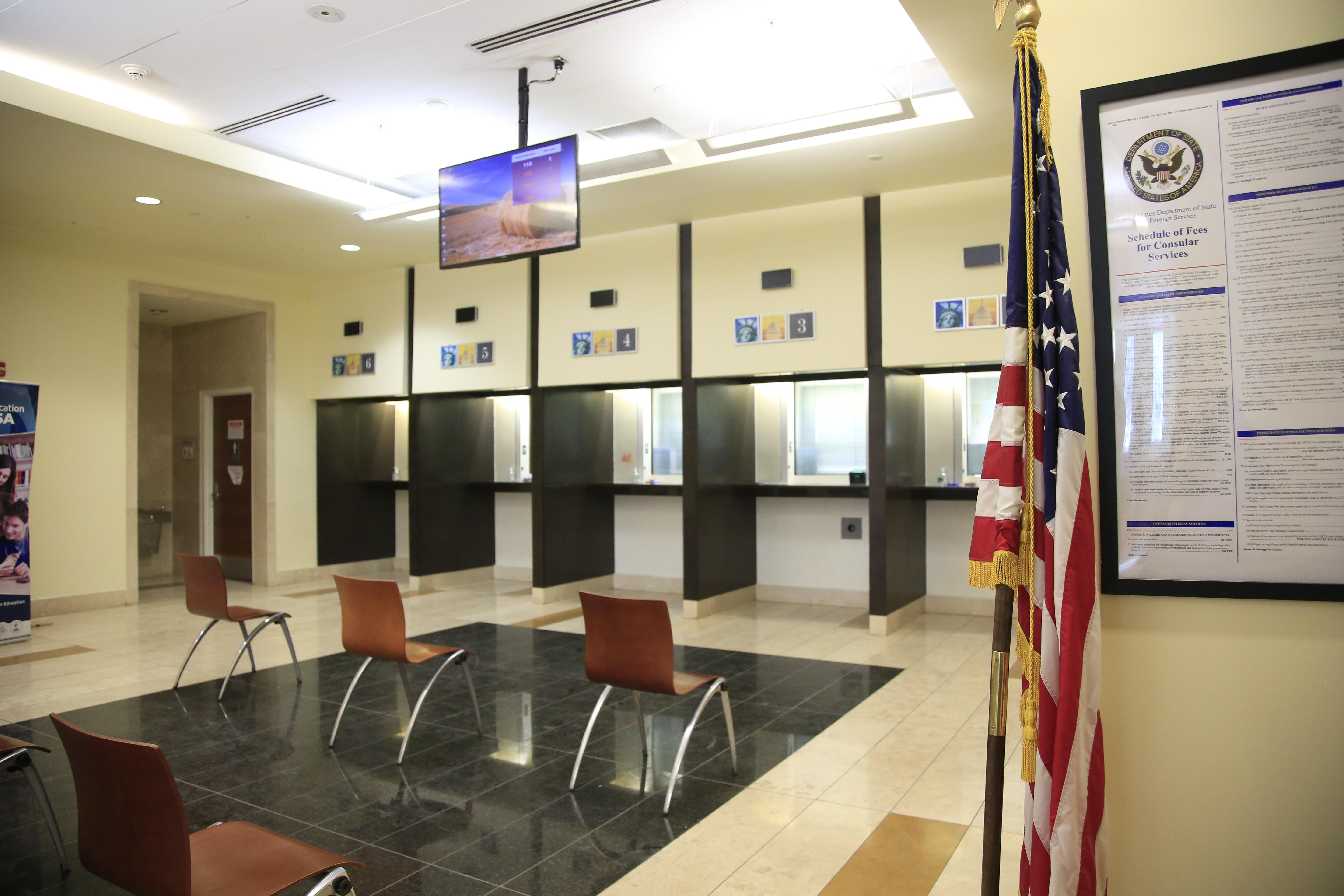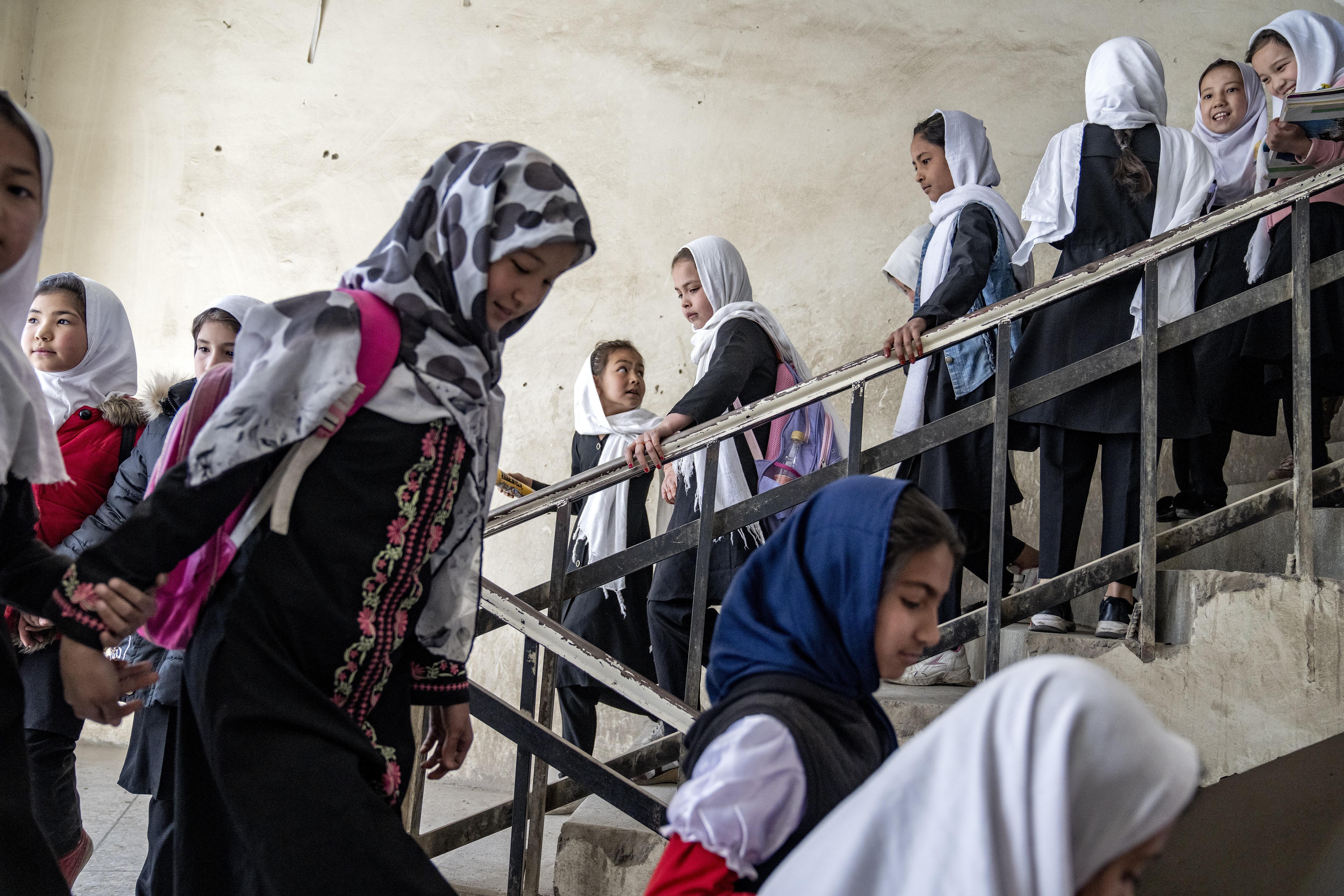 Inside of the US visa center at the Embassy of the United States of America is shown in Kabul, Afghanistan, July 30, 2021. (PHOTO / AP)
Inside of the US visa center at the Embassy of the United States of America is shown in Kabul, Afghanistan, July 30, 2021. (PHOTO / AP)
WASHINGTON / UNITED NATIONS - A program that resettles in the United States Afghans who worked with the US government could grind to a halt later this year, stranding tens of thousands at risk of Taliban retribution following the 2021 US troop pullout from Afghanistan.
The congressionally-authorized limit of 38,500 Special Immigration Visas (SIVs), which offer a path to US citizenship, is expected to be reached sometime around the August anniversary of the withdrawal, and it looks unlikely that the divided US Congress will approve a Biden administration request for 20,000 more.
Once the remaining SIVs are issued, more than 10,000 applicants and their families cleared for final vetting and interviews outside Afghanistan would be unable to begin new lives in the United States, said a State Department official who requested anonymity
"We have somewhere around 8,000 (SIVs) left," State Department spokesman Matthew Miller told a briefing. "We have urged Congress to raise the cap and allow us to meet our obligation to those Afghans who put their lives on the line for the United States."
ALSO READ: UN chief: Consensus reached on 'some key issues' on Afghanistan
Once the remaining SIVs are issued, more than 10,000 applicants and their families cleared for final vetting and interviews outside Afghanistan would be unable to begin new lives in the United States, said a State Department official who requested anonymity.
Tens of thousands of other Afghan applications that have not reached that stage also are awaiting processing.
A failure to raise the SIV cap would be a “moral tragic travesty and national security failure” on the part of Congress, said Jason Crow, a Democrat and Army veteran who served in Afghanistan and is leading efforts in the House of Representatives to raise the limit.
The program’s potential end comes amid an immigration backlash fueled by former President Donald Trump, the expected Republican presidential nominee, and United Nations reports that the Taliban have killed, arrested and tortured hundreds of former officials and soldiers since the Islamists seized Kabul.
The Taliban, who issued a general amnesty for officials and troops of the former US-backed government, deny the UN's charges.
130,000 applications still unprocessed
The administration proposal is caught in the infighting over financing the government through September, with no agreement to include it.
Shawn VanDiver, president of #AfghanEvac, the main coalition of volunteer and veterans groups helping to resettle at-risk Afghans, said House Speaker Mike Johnson was blocking the proposal and "unilaterally preventing tens of thousands of eligible Afghans from accessing their American dream."
Johnson's office did not immediately respond to a request for comment.
READ MORE: Afghanistan stresses positive ties with world community
Even 20,000 more visas, however, “would not be enough to finish the job," said VanDiver.
He pointed to a State Department report in September that some 130,000 full or partial applications were awaiting processing. That number did not include applicants’ families, who are not covered by the SIV cap and average more than four members each.
“We have an obligation to the tens of thousands of Afghans who stood with us through 20 years of battle,” said Rep. Brad Wenstrup, a Republican who served in Iraq.
He co-sponsored a bill with Crow last year to add 20,000 visas to the SIV cap and extend the program through 2029.
Since 2014, the program has been extended and the cap raised by Congress almost annually, although application processing slowed significantly under Trump’s administration, leaving a massive backlog.
READ MORE: Kabul eyeing improved regional ties seen as a positive move
Congress set the current cap of 38,500 visas in 2022. But while the Democratic-run Senate last year approved raising the ceiling and extending the program, House Republicans balked.
Meanwhile, SIV processing has accelerated significantly following steps taken by the Biden administration or mandated by Congress that streamlined the application process.
Between September 2021 and last month, the State Department issued some 39,100 SIVs, the State Department official said.
“We’re … kind of a victim of our own success,” Crow said of the increased approval rate.
Still, a congressionally mandated nine-month SIV application processing rate is not being met, said Adam Bates of the International Refugee Assistance Project.
“It would be unconscionable for this group of people to ... get caught up in this partisan morass,” he said.
 Girls attend school on the first day of the new school year, in Kabul, Afghanistan, on March 25, 2023. Two years after the Taliban banned girls from school beyond sixth grade, Afghanistan is the only country in the world with restrictions on female education. Now, the rights of Afghan women and children are on the agenda of the United Nations General Assembly, Sept 18, 2023, in New York. (PHOTO / AP)
Girls attend school on the first day of the new school year, in Kabul, Afghanistan, on March 25, 2023. Two years after the Taliban banned girls from school beyond sixth grade, Afghanistan is the only country in the world with restrictions on female education. Now, the rights of Afghan women and children are on the agenda of the United Nations General Assembly, Sept 18, 2023, in New York. (PHOTO / AP)
Engagement with Afghan Taliban stressed
The top UN envoy in Afghanistan on Wednesday stressed the need for engagement with the Taliban.
UN Security Council Resolution 2721, adopted at the end of last year, provides a clear goal for the international community's engagement with the de facto authorities. The end state is an Afghanistan at peace with itself and its neighbors, fully reintegrated into the international community and meeting its international obligations - with the full participation of Afghan women, said Roza Otunbayeva, the UN secretary-general's special representative and head of the UN Assistance Mission in Afghanistan (UNAMA).
The conditions for reintegration also reflect the expectations of Afghanistan's population, especially the full respect for the rights of women and girls, the rights of ethnic and religious communities, and the need for greater economic opportunity, she added.


